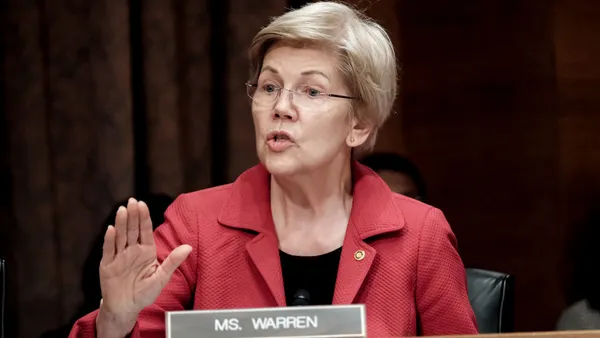Dive Brief:
- Robinhood’s crypto unit will pay a $30 million penalty to settle a New York Department of Financial Services (NYDFS) investigation over “significant” anti-money laundering and cybersecurity shortcomings, the state regulator said Tuesday.
- Robinhood’s Bank Secrecy Act and anti-money laundering compliance program was poorly staffed and failed to timely transition from a manual transaction monitoring system that was inadequate for the business’s size, customer profiles and transaction volumes, the regulator said.
- In a separate move Tuesday, the company cut its workforce by 23% — or roughly 780 employees — and announced it would be closing two offices, according to a Securities and Exchange Commission (SEC) filing.
Dive Insight:
Tuesday’s penalty and job cuts mark the end of a tumultuous year since Robinhood went public on Nasdaq in late July 2021.
“I anticipated that what we saw in 2020 and 2021 in terms of market conditions would last longer,” Robinhood CEO Vlad Tenev said Tuesday, according to Bloomberg. “The reality of it was we over-hired.”
Many of the reductions are concentrated in operations, marketing and program management, Tenev said in a blog post Tuesday. The cuts come atop a 9% workforce reduction the company initiated in April.
“As CEO, I approved and took responsibility for our ambitious staffing trajectory — this is on me,” Tenev wrote.
Perhaps the highest-profile departure Tuesday is Robinhood’s chief product officer, Aparna Chennapragada, who will stay on in an advisory role through January, the company disclosed in its filing.
Others who are losing their jobs will be allowed to remain with Robinhood through Oct. 1, Tenev wrote in the blog post. The job cuts were couched as a restructuring in which “general managers” take broad responsibility for parts of the business to get rid of hierarchies.
Robinhood expects to incur roughly $30 million to $40 million in charges in the third quarter, mostly stemming from employee severance and benefit costs, and another $15 million to $20 million related to the office closures and contract termination fees, the company said in its filing.
Robinhood disclosed its second-quarter earnings Tuesday, too — a day ahead of schedule. The company reported a $295 million net loss and a 44% slump in net revenue — to $318 million — from a year earlier. The brokerage saw a 31% dip in assets under custody, compared with the previous quarter, and a 1.9 million-person drop — to 14 million as of June — in its monthly active user count. Revenue tied to customers’ trading activity fell 55% in the second quarter to $202 million.
The penalty
The penalty, meanwhile, is not a surprise to Robinhood. The company warned in an SEC filing more than a year ago that it had set aside $15 million to account for “probable losses” in connection with an NYDFS probe into anti-money laundering and cybersecurity-related issues.
“We have made significant progress building industry-leading legal, compliance and cybersecurity programs, and will continue to prioritize this work to best serve our customers,” Cheryl Crumpton, Robinhood’s associate general counsel of litigation and regulatory enforcement, told The Wall Street Journal in a statement Tuesday.
Among the missteps NYDFS cited, Robinhood failed to comply with consumer protection requirements by not listing a phone number on its website to address consumer complaints.
Tuesday’s consent order marks NYDFS’s first crypto enforcement action.
“As its business grew, Robinhood Crypto failed to invest the proper resources and attention to develop and maintain a culture of compliance,” the regulator’s superintendent, Adrienne Harris, said Tuesday. “DFS will continue to investigate and take action when any licensee violates the law or the Department’s regulations, which are critical to protecting consumers and ensuring the safety and soundness of the institutions.”
As part of the settlement, Robinhood must retain an independent consultant to evaluate its compliance with state regulations and remediation efforts.
NYDFS’s findings stem from a supervisory examination and subsequent enforcement investigation, the regulator said. The agency deemed “unacceptable” the manual system Robinhood used in September 2019 to review more than 106,000 transactions a day worth $5.3 million, according to the consent order.
NYDFS also said Robinhood improperly certified that it complied with the agency’s transaction monitoring and cybersecurity regulations.
Acquisition rumors
Despite the slumping performance, Robinhood CFO Jason Warnick remained bullish that the company would remain independent. Sam Bankman-Fried, founder of the crypto exchange FTX, took a 7.6% stake in Robinhood in April, spurring rumors he may be interested in acquiring it.
“To the contrary of being acquired, we actually think that we should be looking more aggressively at opportunities to acquire other companies that would help speed our innovation,” Warnick said Tuesday, according to The Wall Street Journal.
Robinhood, over the past two years, has been saddled with several enforcement actions. The Financial Industry Regulatory Authority (FINRA) last summer ordered the company to pay nearly $70 million to settle allegations the company misled customers, approved ineligible traders for risky transaction types, and failed to adequately supervise technology that left customers locked out of the platform during high-demand periods.
Roughly six months earlier, Robinhood agreed to pay $65 million after the SEC found the company failed to disclose its payment-for-order-flow business model until 2018.












